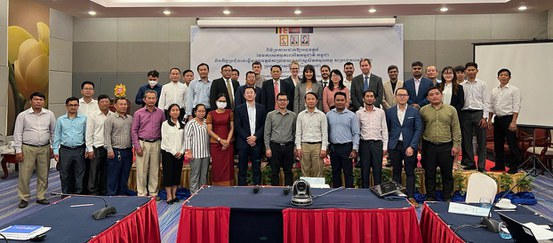Cambodia Launches First-Ever National Cooling Action Plan With the Support of UNESCAP and EF China
Several years ago, Energy Foundation China (EF China) signed a memorandum of understanding (MOU) with the United Nations Economic and Social Commission for Asia and the Pacific (UNESCAP) to advance low carbon development in Southeast Asia. Last month, EF China achieved an important outcome of joint work conducted under that MOU on one of the key priorities identified—cooling efficiency.
On March 9, 2023, Cambodia launched its first-ever National Cooling Action Plan (NCAP), with a goal to realize Cambodia’s long-term development vision in building a sustainable, green, clean, and low-carbon society based on climate-friendly and energy efficient technology in the cooling sector. Cambodia is the first country in Southeast Asia to develop and implement a comprehensive NCAP.

Launch Event of Cambodia’s National Cooling Action Plan, Photo: UNESCAP
Cooling services account for 45 percent of electricity use in Cambodia. The successful implementation of the NCAP is expected to contribute to over 2,000 gigawatt hours (GWh) of total savings potential in 2040, representing a 23 percent savings from business as usual (BAU). The electricity savings come from improvements in building space cooling (59 percent of the total savings), food cold chain (30 percent of the total savings), and process cooling (11 percent of the total savings).
Via our partnership with UNESCAP, EF China supported the development of a methodology to assist countries in identifying pathways and comprehensive actions to reduce energy-related emissions from cooling, including aligning with plans related to refrigerant transition. This methodology directly contributed to the development of Cambodia’s NCAP. EF China staff was honored to stand alongside Cambodian government officials when the NCAP was first announced at COP27 last November, and again when it was formally released last week.
EF China looks forward to ongoing collaboration with UNESCAP and Cambodia to provide further technical assistance for the implementation of the NCAP, in particular by contributing China’s experiences and expertise in upgrading the energy efficiency of cooling systems and promoting sustainable cooling solutions. Through cooperation with UNESCAP, the “Cool Coalition” led by the United Nations Environment Programme (UNEP), and other partners, EF China also looks forward to cooperating with Cambodia in the prioritized areas such as passive cooling strategies demonstration, building code development in Cambodia as well as Minimum Energy Performance Standards (MEPS) for products such as room air conditioners, refrigerators, and fans.
Looking beyond Cambodia, EF China is also excited for further opportunities to expand progress on sustainable cooling in the Asia-Pacific region, with NCAPs under development in Indonesia and Vietnam. EF China’s work in Cambodia has demonstrated a successful business model—i.e., working with the multilateral platform UNESCAP—for engaging in policy development efforts in the region.
It is vital to drive global action on sustainable cooling in order to meet the Kigali Amendment goals for phasing-out hydrofluorocarbons and the global goal to limit warming below 1.5°C.




